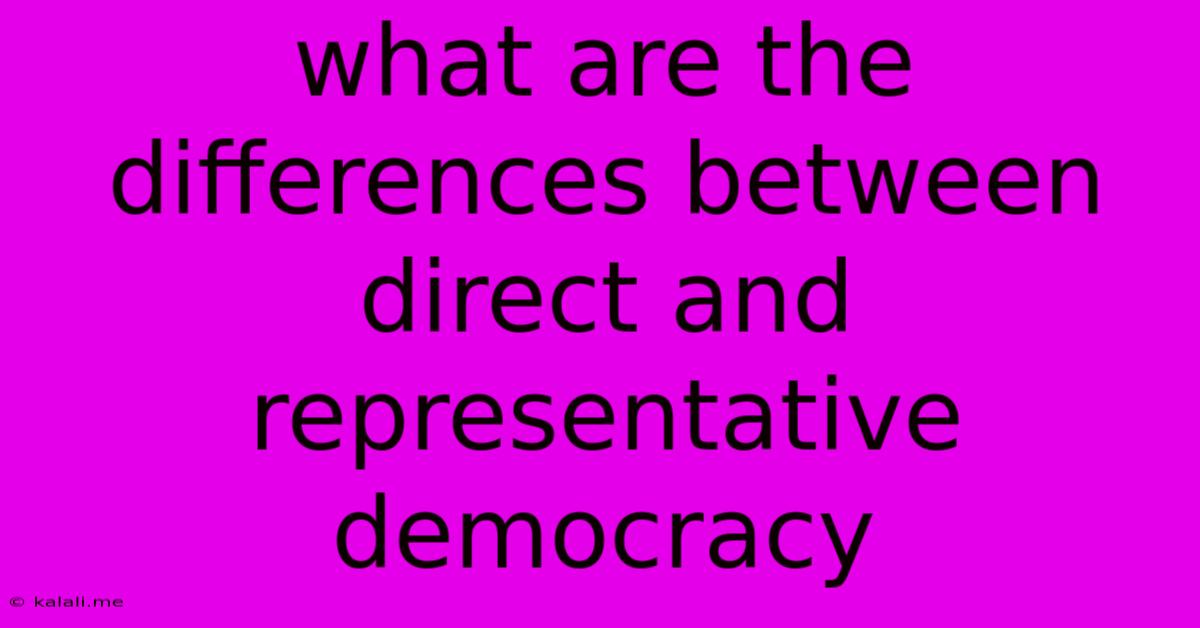What Are The Differences Between Direct And Representative Democracy
Kalali
Jun 12, 2025 · 3 min read

Table of Contents
Direct vs. Representative Democracy: Understanding the Core Differences
Understanding the nuances between direct and representative democracy is crucial for any engaged citizen. While both aim for government by the people, their mechanisms and implications differ significantly. This article delves into the core distinctions, exploring their strengths, weaknesses, and real-world applications. This will equip you with a comprehensive understanding of these fundamental governmental structures and their impact on political participation and policy-making.
What is Direct Democracy?
Direct democracy, also known as pure democracy, is a system where citizens participate directly in decision-making. Instead of electing representatives to make laws on their behalf, citizens themselves vote on policies, laws, and government decisions. This can be achieved through various methods, including:
- Referendums and initiatives: Citizens propose and vote directly on specific policies or laws.
- Citizen assemblies: Randomly selected citizens deliberate and make decisions on specific issues.
- Town hall meetings: Open forums where citizens can directly voice their opinions and participate in discussions about local governance.
Advantages of Direct Democracy:
- Increased citizen participation: Direct engagement fosters a stronger sense of civic responsibility and ownership.
- Enhanced accountability: Government officials are directly answerable to the citizens who can easily remove underperforming leaders.
- More responsive government: Policies are directly influenced by the will of the people leading to potentially faster responses to public needs.
Disadvantages of Direct Democracy:
- Inefficient for large populations: Managing and organizing votes on every issue becomes highly impractical and costly in larger populations.
- Susceptible to manipulation: Sophisticated campaigns can sway public opinion, potentially leading to unjust policies.
- Tyranny of the majority: The rights of minority groups can be easily overridden by the preferences of the majority.
- Lack of expertise: Citizens may lack the necessary knowledge and expertise to make informed decisions on complex policy issues.
What is Representative Democracy?
Representative democracy, also known as indirect democracy or republic, is a system where citizens elect representatives to make decisions on their behalf. These representatives, typically members of parliament or congress, are responsible for creating and enforcing laws. This system is the most prevalent form of democracy globally.
Advantages of Representative Democracy:
- Efficient for large populations: It's manageable and efficient even with large populations.
- Specialized expertise: Elected officials often possess the knowledge and skills needed to navigate complex policy issues.
- Protection of minority rights: Representatives are expected to consider the interests of all constituents, including minorities.
- Greater stability: The process of electing representatives provides a degree of continuity and prevents abrupt shifts in policies.
Disadvantages of Representative Democracy:
- Reduced citizen participation: Limited opportunities for direct involvement in decision-making can lead to lower civic engagement.
- Potential for corruption: Representatives may act in their own self-interest rather than the interests of their constituents.
- Lack of responsiveness: Representatives may not always accurately reflect the views and needs of the people they represent.
- Influence of special interests: Lobbying and campaign contributions can disproportionately influence policy-making.
Hybrid Systems:
It's important to note that many countries utilize hybrid systems, incorporating elements of both direct and representative democracy. For example, some countries hold referendums on significant issues while still operating within a representative framework. This blend seeks to balance the benefits of both approaches while mitigating their respective weaknesses.
Conclusion:
Both direct and representative democracies strive for governance by the people. However, their practical application and inherent strengths and weaknesses differ significantly. Understanding these differences is crucial for analyzing the effectiveness of various democratic systems and advocating for improvements in civic engagement and policy-making. The choice between these models or a blend of both is often dependent on factors such as population size, societal complexity, and cultural norms.
Latest Posts
Latest Posts
-
What Is The Lcm Of 8 12 And 15
Jun 13, 2025
-
Which Of The Following Is Not Part Of A Nucleotide
Jun 13, 2025
-
Which Term Means Movement Toward The Midline
Jun 13, 2025
-
Which Of The Following Is Not Included In National Income
Jun 13, 2025
-
Where Is Most Of The Mass Of The Atom Found
Jun 13, 2025
Related Post
Thank you for visiting our website which covers about What Are The Differences Between Direct And Representative Democracy . We hope the information provided has been useful to you. Feel free to contact us if you have any questions or need further assistance. See you next time and don't miss to bookmark.